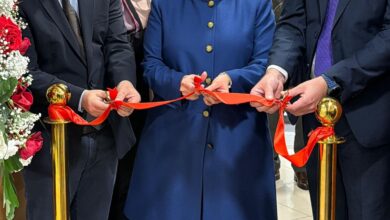70 percent attendance at Ministries Complex during first Ramadan shift
Security and traffic measures regulated congestion during peak hours. Auditors were scarce, but employees remained committed.

Traffic congestion, particularly during the beginning and end of work hours, was managed by a security and traffic presence aimed at regulating traffic and ensuring discipline. Auditors had a minimal presence, while employees showed commitment.
This was the most notable observation by Al-Qabas during its tour of the country’s regions on the first day of Ramadan.
Amidst well-wishes for the holy month, discussions ranged from elections and road issues to rising prices, particularly for slaughtered animals, and an extension of the camp period, marking the passage of the first Ramadan shift at the Ministries Complex. Responsible sources indicated that the employee attendance rate exceeded 70%, with reasons for absences ranging from scheduled leave to emergencies, sickness, and medical leave.
Despite the traffic congestion that occurred on most of the main roads on Monday morning, employees showed up on time at the beginning of work in all health sectors. There was a modest presence of visitors during the initial hours of work, facilitating the completion or delivery of their transactions to the sector or relevant department easily.
Inspection teams
The source explained that inspection teams identified individuals who were absent without valid excuses and those who were not present in their offices. These individuals will be referred to legal affairs in all ministries. It was emphasized that all ministers have recommended not turning a blind eye or being lenient in penalizing any absentee or individual who takes advantage of Ramadan to neglect their work duties.
Dozens of transactions were completed smoothly and without any disruptions, while some offices remained open under the pretext of breaking the fast due to fasting.
Seeking permission at the end of the workday became a common practice during the last two hours of work, with many resorting to it to end their shift for various reasons. According to Al-Qabas sources, the percentage of permission requests increased to 60% in most ministries.
Electronic achievement
Officials from service agencies, including those in justice, finance, and affairs, have confirmed that completing transactions electronically has contributed to reducing congestion and minimizing the presence of many customers required to complete their transactions. They point out that the expansion of e-government applications has diminished the need for individuals to visit government agencies in person, as most transactions are now completed online. This has led to a reduction in the documentary cycle compared to the previous method.
The source revealed recommendations from all ministers not to turn a blind eye or be lenient in punishing any absentee, or those who use fasting as an excuse for laziness, absenteeism, lack of productivity, or negligence at work.
80% attendance of court employees
Commitment prevailed in the court halls across all governorates, with an attendance rate of employees exceeding 80%, and transactions were completed as usual.
Regarding court sessions, 99% compliance was observed among lawyers and defendants’ attending their sessions, as is customary. It is noteworthy that absenteeism leads to the cancellation of sessions in some cases, their postponement to potentially lengthy periods, or the issuance of judgments in absentia.
Due to these reasons, commitment remained high, whether during Ramadan or on any other day.
Schools witnessed varying attendance
The country’s schools witnessed varying attendance among students, with some schools experiencing full attendance while others noted a noticeable absence.
It was observed that teachers were committed to ensuring attendance, especially with the use of the fingerprint application.
In addition to exchanging blessings for the holy month, some schools also exchanged ‘shortages’ and Ramadan distributions, especially those with female staff.
Kuwait University maintains normal attendance rate
On the first day of Ramadan, Kuwait University experienced its usual attendance rate among both students and professors. Students attended their lectures regularly, while the percentage of professors who apologized for missing lectures was small.
It was noted that some professors were lenient when students arrived late for lectures, especially considering the morning traffic congestion. Meanwhile, students exchanged congratulations on the occasion of the holy month of Ramadan.
The attendance rate among university administrators was also high, thanks to the flexible attendance policies that made it easier for employees. Across various departments, the rate of absence remained typical.











